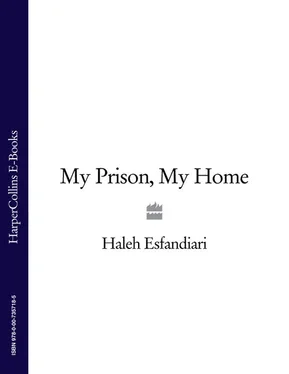Abadan was the heart of Iran’s oil industry. At the time, the Abadan oil refinery was the largest in the world. The very air smelled of gas and oil; at night, from almost any vantage point, one could see the flames from the flared gas of the oil wells licking at the tall chimney that towered over the refinery. The oil industry was by far the city’s largest employer, and employees lived in oil company housing and socialized in oil company clubs. Abadan had also been, in many ways, a very British city. Thousands of Englishmen had worked for the AIOC and lived with their families in Abadan. There was Iranian staff, too, but with few exceptions the senior management and technical positions were held by Englishmen. The English and the Iranians worked together but led separate lives. The English lived in Braim; most of the Iranians lived in Bavardeh, a totally separate housing development. The English frequented the Gymkhana Club, the Iranians the Iran, Bavardeh, and Golestan clubs. The laborers, poorly paid Iranians despite AIOC’s high profits, lived mostly in shantytowns. Abadan had its own halabi-abad and hassir-abad , “tin town” and “straw-mat town,” named after the shacks made out of flattened oilcans or straw mats that were laid across scaffolding of sticks and wood.
When the oil industry was taken over and the British driven out, all these facilities were seized by the Iranian government. When we arrived in Abadan, we were assigned a house in the upscale Braim district.
Abadan had a different feel to it than Tehran or Karaj. I associated Tehran with the mountains and the plains that ran south and east to the Kavir Desert. The air was hot and dry in the summer, crisp and cold in winter. There was no hint of the sea, no touch of dampness in the air. Abadan, by contrast, was built on the Shatt al-Arab, the border river between Iran and Iraq, and abutted the Persian Gulf. It was a port city. There were palm and banana trees as well as lush bougainvilleas. The local people were dark-complexioned, seafaring. Most spoke Arabic and Persian with a pronounced Arabic accent.
But for a curious child, Abadan meant a recovery of freedom. Our house had a large garden surrounded by hedges. My parents joined the Boat Club, with its clubhouse on the riverbank built to resemble a boat, and the Golestan Club, within walking distance of the house. I could check out all the books I wanted from the club library. Mother didn’t read Persian, and Father was too busy to notice. At the age of thirteen I read Victor Hugo, Anatole France, Albert Camus, John Steinbeck, and Ernest Hemingway in translation, as well as a great many Persian novels. It was in Abadan that I developed my love for literature.
Despite the long British presence, there were no bilingual schools in Abadan, and I attended the local Persian elementary school. I walked into the schoolyard on my first day and saw students crowded around a little boy, perhaps eight years old, lying on his back with his legs in the air. The assistant principal was caning the soles of his bare feet. I was horrified. Jeanne d’Arc had been strict, but punishment had meant sitting alone in a corner or being banished from the classroom.
Yet the oil company itself retained a strong British feel to it. Senior Iranian staff who had worked for the AIOC and studied in England often spoke English to one another. They sent their children to English boarding schools. At the card table, my parents’ new bridge partners referred to clubs, hearts, diamonds, and spades, rather than trèfle, coeur, carré , and pique , the French terms common among their friends in Tehran. Mutti arranged for me to take English lessons with a private tutor.
Since the summers in Abadan were very hot and humid, we would come to Tehran for a month, staying two weeks with my grandmother and two weeks with our extended family in villages in Arak, some two hundred miles northwest of Tehran. We rode donkeys and picked and ate fruits straight from the trees, and cucumbers from the long, straight rows of the cucumber beds. We wandered for hours in the fields and watched the villagers swinging their scythes and harvesting the wheat.
But politics intruded on our idyllic life in Arak and roiled the lives and opinions of our usually apolitical family. The British were determined to undo the oil industry’s nationalization, which had meant the loss of a valuable asset as well as a challenge to their imperial authority. They feared a precedent that would threaten their other holdings (indeed, President Nasser of Egypt would nationalize the Suez Canal five years later). In retaliation for the nationalization of the AIOC, the British had frozen Iran’s sterling assets, had successfully imposed a boycott on the sale of Iranian oil, and although we didn’t know it then, were secretly plotting to overthrow Mossadegh and persuade the United States to join them in the scheme. As a result of the oil boycott and assets freeze, the economy was suffering, business was slow, and imports had dwindled. Mossadegh was also locked in a struggle with the shah over power and constitutional authority; things seemed unstable as demonstrators took over the streets.
In the evenings, my relatives heatedly debated the situation. The family was divided, some loyal to Mossadegh and others to the shah; some enthusiastic about oil nationalization, others worried about the direction in which Mossadegh was taking the country: “He is allowing the left and the Communists too much power.” “No, he is the only politician who dared stand up to the British and defend Iran’s honor.” “Yes, but he is leading the country into anarchy.” So went the arguments, back and forth. I remember a younger cousin, an ardent supporter of Mossadegh, accusing his aunts and uncles of caring more about their villages than about Iran. For the two branches of the family, the Bayats and the Esfandiaris, the issues were especially fraught. Mossadegh, the aristocrat who had emerged as a defender of the masses, was a close relative. His mother, Najm al-Saltaneh, a lion of a woman, was the second wife of my great-grandfather Vakil ol-Molk-e Dovvom and the grandmother of many Bayats. Mossadegh’s son, Gholam Hossein, and his wife, Malekeh, were close friends of my mother and father.
The family was proud that once again one of their own was now prime minister; and they both admired and were awed by Mossadegh’s crafty political maneuvering and the oratorical skills that turned him into a popular hero. But Mossadegh, irascible and headstrong, had also released radical forces. Workers were organizing and demanding higher wages. Talk of land reform was threatening to large landowners, including the Bayats and the Esfandiaris. The Tudeh, or Communist, Party was rising in popularity and influence. The endless political turmoil, strikes, and street demonstrations made members of the family nervous. Vigilante violence hit close to home. Brigadier General Mohammad Afshartous, Mossadegh’s police chief, who was kidnapped and murdered, had married into the Bayat family. Worried by the rising radicalism and violence, the Bayats sent a family delegation to visit Mossadegh and to beg him to curb the disorder. He heard them out but did nothing to assuage their anxieties.
Mossadegh was also challenging the shah’s authority, asserting the primacy of parliament and his prerogatives as prime minister. In July 1952, Mossadegh resigned when both he and the shah claimed the right to name the minister of war. After two days of pro-Mossadegh rioting, the shah stood down, and Mossadegh returned to office in triumph, more powerful than before. Members of the family were torn: they felt instinctive loyalty to their famous relative; some found attractive the idea championed by Mossadegh that authority should rest with the parliament and that the shah should reign and not rule. But they also feared for the stability of the throne and the long-term stability of the country; and Mossadegh’s seeming radicalism made them uneasy.
Читать дальше












